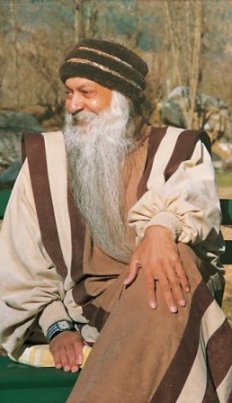Osho - Sound of one Hand Clapping
Osho : If you have heard
about Zen masters... they go on telling their disciples to go and meditate,
meditate on the sound of one hand clapping. We can create a sound by
clapping two hands. Zen masters say to their disciples, ”Go and find out
that sound which comes out of only one hand: the clapping of one hand, not
with anything else.”
We know this is
absurd. A sound can come only with conflict, with two things clashing. Two
hands can create sound, not one hand. Zen masters also know that, but still
they have been giving this meditation for centuries. From Buddha up to now,
Zen masters go on giving it. They know, their disciples know, that this is
absurd. Then what is the significance? One has to watch, meditate, and move
towards a sound which is already there, which is not created. That is the
meaning of the sound of one hand.
I have
heard a story.
A small boy, just ten or twelve years of age, lived in a Zen monastery.
Every day he would see many seekers coming to the master to ask for help,
methods, techniques, guidance. He also became attracted, so one day he also
came in the morning in the same way a seeker comes to a Zen master. With
deep reverence he bowed down seven times. The master started laughing:
”What has happened to
this boy?”
And then he sat in the
way seekers should sit before a Zen master. Then he waited, as seekers
should wait, for the master to ask, ”Why have you come?”
The master asked,
”Toyo” – Toyo was the name of the boy – ”why have you come?”
So Toyo bowed down and
said, ”Master, I have come in search of truth. What shall I do? How should I
practice?”
The master knew that
this boy was simply imitating, because everybody he heard came and asked the
same questions, so just jokingly the master said, ”Toyo, you go and
meditate. Two hands clapping can create a sound. What is the sound of one
hand clapping?” Toyo bowed down seven times again, went back to his room,
started meditating. He heard a geisha girl singing, so he said, ”Right, this
is the thing.”
He came immediately,
bowed down. The master was laughing. He said, ”Did you meditate, Toyo?”
He said, ”Yes sir, and
I have found it: it is like a geisha girl singing.”
The master said, ”No,
this is wrong. Go again, meditate.”
So he went again,
meditated for three days. Then he heard the sound of water dripping, so he
said, ”Right now, this is the thing – I have got it.” He came again, the
master asked... he said, ”The sound of the water dripping.”
The master said,
”Toyo, that too is not it. You go and meditate.”
So he meditated for
three months. Then he heard locusts in the trees, so he said, ”Yes, I have
got it.” He came again.
The master said, ”No,
this too is not right.”
And so on and on. One
year passed. Then for one year continuously he was not seen. The master
became anxious: ”What happened to the boy? He has not come.” So he went to
find him. He was sitting under a tree, silent, his body vibrating to some
unknown sound; his body dancing, a very gentle dance, as if just moving with
the breeze.
The master didn’t like
to disturb the boy, so he sat there waiting. Hours and hours passed. When
the sun was setting and it was evening, the master said, ”Toyo?” The boy
opened his eyes and he said, ”This is it.”
The
master said, ”Yes,
you have got it!”
This aum is that
sound. When all sounds disappear from the mind, then you hear a sound. The
Upanishads have made that sound the symbol of the whole, because whenever
the whole happens to the part, it happens in that music of aum, in that
harmony of aum.
Source: from book “Vedanta: Seven Steps to Samadhi” by Osho
|
